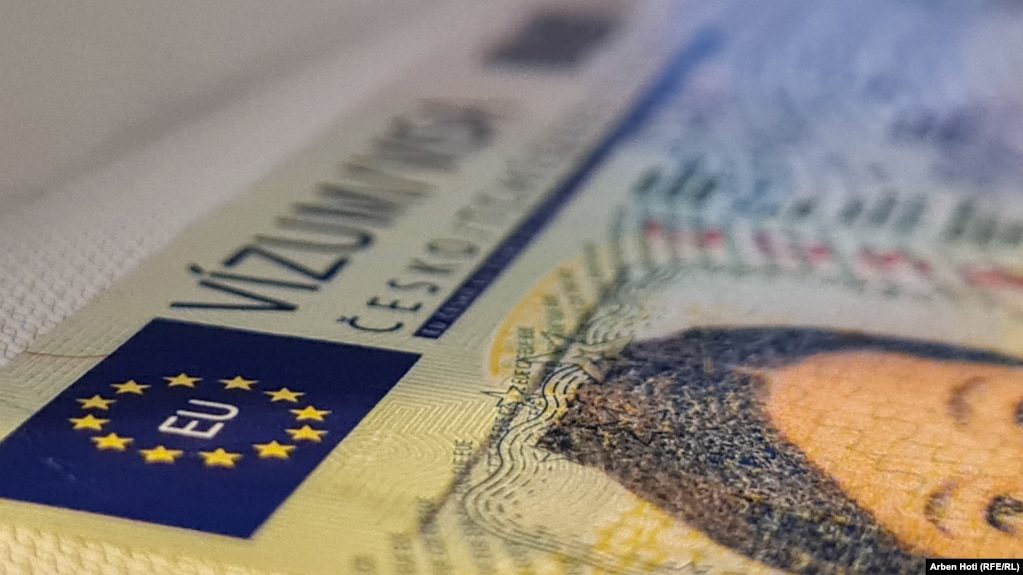The issue of visa liberalization for Kosovo will be on the agenda at the European Council working group meeting on October 13, EU diplomatic sources in Brussels confirm.
The Czech Presidency of the EU has already sent a letter to member states as a warning for discussions on this topic.
Radio Free Europe has secured access to this document, and it clearly expresses the desire of the Czech Republic for all EU member states to reach an internal consensus to support visa liberalization for Kosovo.
In this letter, the Czech Republic refers to, as it says, the foreign policy reasons for visa liberalization for Kosovo, recalling that the European Commission has also confirmed and is expected to repeat that Kosovo has fulfilled the conditions.
“Since the Czech Presidency thinks that the reasons related to foreign policy for visa liberalization for Kosovo are convincing, it hopes that all EU member states will reach an internal political agreement on this issue”, this document states.
“The EU’s geopolitical approach to the Western Balkans is indispensable. The region needs a clear signal that the EU enlargement process is credible and that the EU is ready to reward the reform efforts made by the countries of the Western Balkans”, this letter states.
The Czech Presidency mentions the liberalization of visas for Kosovo as an example of how the EU can increase credibility in the region.
“The liberalization of visas is a key element in the process of Kosovo’s integration into the EU, which is already long overdue. Kosovo is the only country in the Western Balkans (and one of the few countries in Europe) that has not yet secured the visa-free regime with the EU. This fact has a significant negative impact on the atmosphere in the country and on the attitudes of the citizens of Kosovo regarding the correctness and credibility of the EU”, the letter states.
It also recalls Kosovo’s journey towards fulfilling the conditions for the free movement of its citizens.
“The European Commission started the visa liberalization dialogue with Kosovo in 2012, while in July 2018 it confirmed that Kosovo has fulfilled all the criteria. The European Parliament, in succession, has confirmed that it supports the liberalization of visas for Kosovo”, the letter states.
The Czech Presidency of the EU states that it expects the European Commission to confirm the positive opinion on visa liberalization for Kosovo.
“The Czech Presidency is in close contact with the European Commission. We agreed on a technical update of the visa liberalization roadmap that would cover the period from the report published in 2018. This technical update is supposed to be presented to the visa working group in October,” the letter also states.
According to her, the Czech Presidency believes that this update will be positive and that it will confirm the results of the Commission’s findings in 2018.
“The ambition of the Czech Presidency is to build support among the member states and start the relevant legislative procedure, which will result in the relaxation of the visa regime for Kosovo”, the letter states.
Through it, the Czech Republic says that it also understands the concerns of some EU member states about the implications that visa liberalization for Kosovo may have on their internal security.
For this reason, the Ministries of Internal Affairs of the member countries are more reserved to approve visa liberalization than the Ministries of Foreign Affairs.
The Czech Republic, however, refers to the assessment of the European Commission for addressing these concerns.
“The European Commission is convinced that the granting of visa liberalization for Kosovo does not pose a risk to member countries in the form of a wave of immigration”, says the Czech Presidency, adding that Kosovo has also taken measures to address these concerns.
“It is also worth noting that the Assembly of the Republic of Kosovo approved the resolution on the liberalization of visas on August 3. With this resolution, Kosovo’s institutions pledge to implement all reforms to guarantee the rule of law, including those related to the fight against corruption and the protection of human rights. The Czech Presidency highly appreciates the adoption of this resolution, which is an important proof of commitment on the part of Kosovo”, the letter states.
The first discussion in the Council’s working group on visa liberalization for Kosovo is expected to take place only one day after the European Commission approves and publishes the annual enlargement package, which will also be accompanied by individual progress reports for the countries involved in this process. .
Even the European Commission has confirmed that it will report positively on the fulfillment of the criteria by Kosovo, regarding the issue of visa liberalization.
Diplomatic sources in Brussels see the Czech intention to start the procedure for the decision on visa liberalization as evidence that there is already a lot of support.
and for this in the Council.
But, despite this, they are reluctant to mention deadlines for when the decision would be approved and when visa liberalization for Kosovo citizens would come into force.
Of the six Western Balkan countries that remain outside the EU, only Kosovo citizens cannot move freely to European countries, or to what is known as the Schengen area.
Kosovo, like Bosnia and Herzegovina, only has a Stabilization Agreement with the EU, which is the first step towards membership in the bloc.
Montenegro, Serbia, Albania and North Macedonia, meanwhile, have opened negotiations for EU membership./REL








